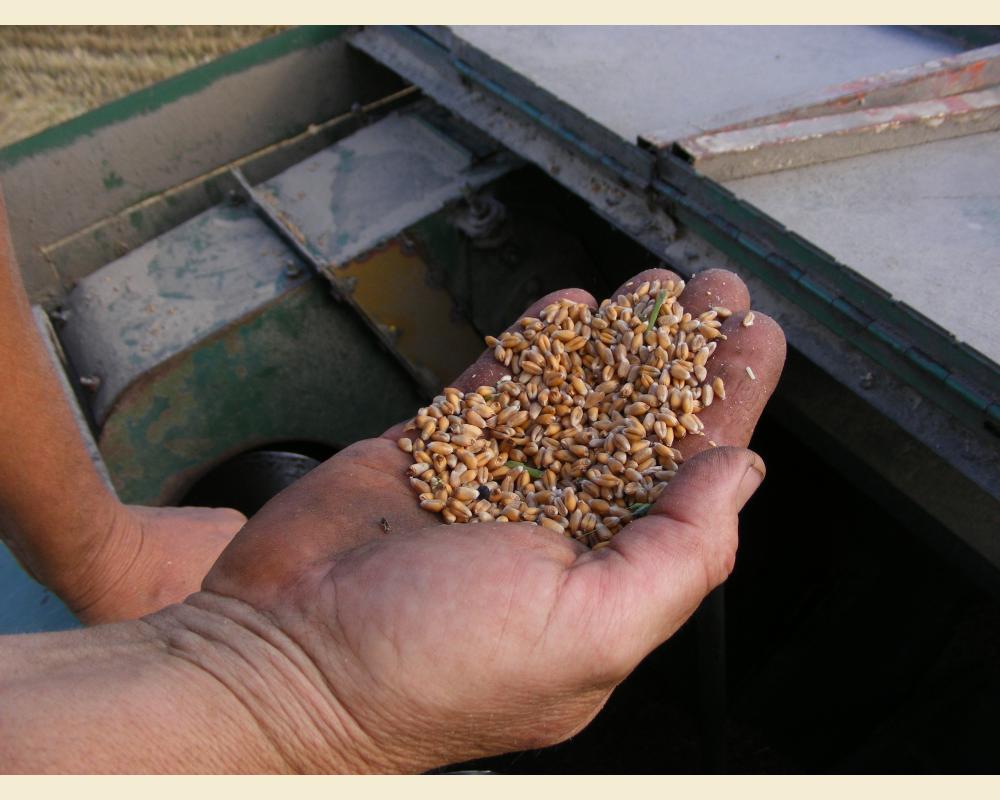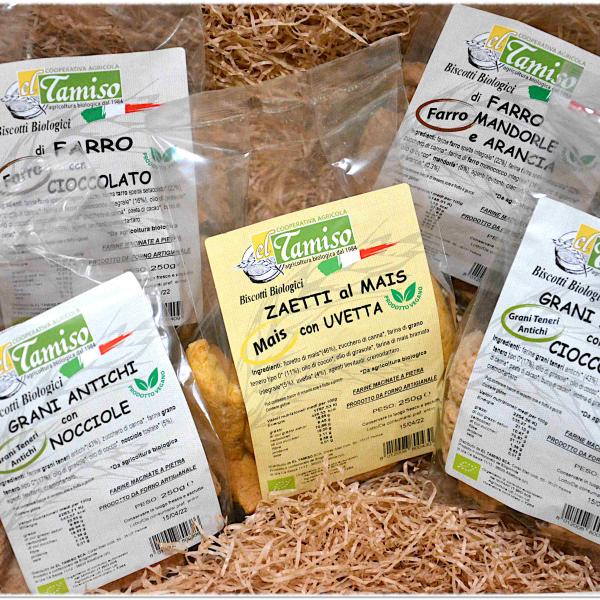CEREALS, FLOURS AND THEIR PROCESSED PRODUCTS
25.02.22

The term “El Tamiso” means “the sieve”, a traditional kitchen tool needed to sift flours, when milling was still more rudimentary and normally stone.
At the time of our foundation, in the early 80s of the 1900s, this name was chosen for two good reasons: one, to sift through ideas and projects (organic, cooperation and restoring social dignity to rural work together, at the time they were not a trivial project, nor are they today) and two to symbolize the relationship between the field and the kitchen, then the countryside and the city, with then a beautiful name in the Venetian dialect.
One of the first activities was the organic cultivation of a wheat field, the collection and storage in a barn, with bags “behind”. From there, every week we went with a few quintals to the Bianchetti mill, in Giavera del Montello, which, with its large water shovel and its ancient natural stone grinders, gave us back the equivalent of whole wheat flour. Flour that was then taken to the Libralon bakery, in Campodarsego, which made bread for us, strictly sourdough and cooked in a wood oven. Bread that then ended up in our first organic store in Via Monte Cengio, in Padua, and came full circle.
Then things grew and we received a significant demand for flours from various organic artisanal bakers in Veneto and beyond.
We came into contact with a more equipped mill, although always artisanal, the Zapparoli Mill in Moglia di Sermide, on the Po', which allowed us to increase wheat production and expand our work; already at the end of the 80s we came to produce and transform more than 5,000 ql of local organic soft wheat, an important quantity for the time.
On the prices of wheat and on the various costs of the “supply chain” to arrive at the price of bread to the final consumer, until then there were no problems: everyone thought they were sufficiently satisfied.
All this, however, attracted the attention of some large industrial mills, which easily managed to reduce the costs of organic milling (even “playing” in terms of fixed costs with contemporary conventional production and with modern mills/rolling mills), and to offer itself on our market at unbeatable conditions.
The same organic artisan, as competition grows, must be able to sell bread for less to the distributor or to the organized chain of stores, so he buys less and less at Tamiso, or to similar entities specialized in local organic food, but from some conventional mixed organic wholesaler, who offers a range of flours, increasingly with non-Italian grains, together with many other organic ingredients for bakeries and pastry shops, such as various vegetable oils and fats, butter, oil, sesame, even rosemary, which come from outside Europe!
Everything certainly meets the criteria set by current European organic standards, but increasingly distant from the idea of the “circular” economy of the beginning of our biological experience, where fair supply chain relationships and the guarantee of local origin were, and are, fundamental, which today the consumer is increasingly looking for.
A decade ago, we were under the illusion that we could overcome the problem by abandoning the market for flours at a “low” price, and taking the wonderful path of recovering and revaluing “ancient” cereals, whether soft or hard grains, spelt spelt and single-coconut spelt, rye, Maranello corn, millet.
Cereals that are certainly able to give adequate answers to the major issues of food intolerances and a balanced and natural diet. From an agricultural point of view, this has involved years of investments in equipment, selection and experimentation. Add to this that generally these cereals produce much less than modern varieties, or that they are more “sensitive” in relation to climate change.
In short, even here we need a chain of relationships, up to the end user, able to recognize the value of his investment to the agricultural producer, which happens if there is adequate sharing of information and relationships of trust between the various “parties”.
The illusion has ended in many cases precisely in front of the price/cost of flours, which are too high in relation to organic “ancient cereals” that come from non-European countries with much lower labor and production costs, and which the usual de-specialized intermediary supply chain offers.
All this to conclude that the only possible way to avoid completely stopping production, which has already been reduced over time, is to reach directly, or almost, the final consumer, with the transformed product.
In this phase we chose artisanal crackers, transformed by “El Forno a Legno”, all with our flours and with Italian organic raw materials and the cookies, transformed by BioGovinda, vegan, in which all the flours are our own production.
In the comparison with a similar product that can be found in any organic store, what impressed us is the comparison between the value of our raw materials and those in ordinary use.
This is why our processed products certainly have a medium/high price.
But if the perspective is always and only a drop in prices, it is good to know that there is no room for local organic productions, the result of agriculture that is truly attentive to fertility, biodiversity, quality and social responsibility.
At the time of our foundation, in the early 80s of the 1900s, this name was chosen for two good reasons: one, to sift through ideas and projects (organic, cooperation and restoring social dignity to rural work together, at the time they were not a trivial project, nor are they today) and two to symbolize the relationship between the field and the kitchen, then the countryside and the city, with then a beautiful name in the Venetian dialect.
One of the first activities was the organic cultivation of a wheat field, the collection and storage in a barn, with bags “behind”. From there, every week we went with a few quintals to the Bianchetti mill, in Giavera del Montello, which, with its large water shovel and its ancient natural stone grinders, gave us back the equivalent of whole wheat flour. Flour that was then taken to the Libralon bakery, in Campodarsego, which made bread for us, strictly sourdough and cooked in a wood oven. Bread that then ended up in our first organic store in Via Monte Cengio, in Padua, and came full circle.
Then things grew and we received a significant demand for flours from various organic artisanal bakers in Veneto and beyond.
We came into contact with a more equipped mill, although always artisanal, the Zapparoli Mill in Moglia di Sermide, on the Po', which allowed us to increase wheat production and expand our work; already at the end of the 80s we came to produce and transform more than 5,000 ql of local organic soft wheat, an important quantity for the time.
On the prices of wheat and on the various costs of the “supply chain” to arrive at the price of bread to the final consumer, until then there were no problems: everyone thought they were sufficiently satisfied.
All this, however, attracted the attention of some large industrial mills, which easily managed to reduce the costs of organic milling (even “playing” in terms of fixed costs with contemporary conventional production and with modern mills/rolling mills), and to offer itself on our market at unbeatable conditions.
The same organic artisan, as competition grows, must be able to sell bread for less to the distributor or to the organized chain of stores, so he buys less and less at Tamiso, or to similar entities specialized in local organic food, but from some conventional mixed organic wholesaler, who offers a range of flours, increasingly with non-Italian grains, together with many other organic ingredients for bakeries and pastry shops, such as various vegetable oils and fats, butter, oil, sesame, even rosemary, which come from outside Europe!
Everything certainly meets the criteria set by current European organic standards, but increasingly distant from the idea of the “circular” economy of the beginning of our biological experience, where fair supply chain relationships and the guarantee of local origin were, and are, fundamental, which today the consumer is increasingly looking for.
A decade ago, we were under the illusion that we could overcome the problem by abandoning the market for flours at a “low” price, and taking the wonderful path of recovering and revaluing “ancient” cereals, whether soft or hard grains, spelt spelt and single-coconut spelt, rye, Maranello corn, millet.
Cereals that are certainly able to give adequate answers to the major issues of food intolerances and a balanced and natural diet. From an agricultural point of view, this has involved years of investments in equipment, selection and experimentation. Add to this that generally these cereals produce much less than modern varieties, or that they are more “sensitive” in relation to climate change.
In short, even here we need a chain of relationships, up to the end user, able to recognize the value of his investment to the agricultural producer, which happens if there is adequate sharing of information and relationships of trust between the various “parties”.
The illusion has ended in many cases precisely in front of the price/cost of flours, which are too high in relation to organic “ancient cereals” that come from non-European countries with much lower labor and production costs, and which the usual de-specialized intermediary supply chain offers.
All this to conclude that the only possible way to avoid completely stopping production, which has already been reduced over time, is to reach directly, or almost, the final consumer, with the transformed product.
In this phase we chose artisanal crackers, transformed by “El Forno a Legno”, all with our flours and with Italian organic raw materials and the cookies, transformed by BioGovinda, vegan, in which all the flours are our own production.
In the comparison with a similar product that can be found in any organic store, what impressed us is the comparison between the value of our raw materials and those in ordinary use.
This is why our processed products certainly have a medium/high price.
But if the perspective is always and only a drop in prices, it is good to know that there is no room for local organic productions, the result of agriculture that is truly attentive to fertility, biodiversity, quality and social responsibility.
PREVIOUS ARTICLE
25. 02. 22
25.02.22
El Tamiso organic cookies!
El Tamiso organic cookies, good... but not only!!
THE FLOURS — these delicious biscuits are made with the flours produced by our members and stone-ground by the La Grande Ruota di Sermide ...
Read




